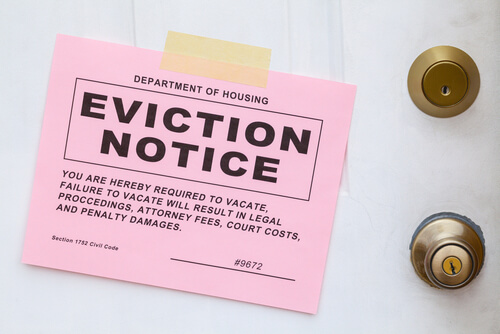In the complex realm of landlord-tenant relationships, termination of a lease can sometimes lead to the unfortunate inevitability of eviction. While it’s a situation no property owner or tenant desires, understanding the factors that can lead to this outcome is crucial for both parties involved.
Let’s explore the circumstances under which termination of a lease can result in eviction and hopefully find some valuable insights and guidance for landlords approaching this necessity.
When Is Eviction Necessary?
Rental brings landlords and tenants together in a uniquely deep relationship whose challenges may sometimes require the termination of a lease and the initiation of eviction proceedings. From non-payment of rent to violations of lease terms, understanding the common issues that can lead to eviction is essential for both parties involved.
Late Rent
When tenants fail their obligations and consistently fall behind on rent, it puts a significant strain on the landlord-tenant relationship. Rent is what ensures a rental home’s financial viability and lets landlords cover expenses like their mortgage, maintenance, and utilities. Unpaid rent disrupts these responsibilities and can ultimately lead to eviction if the issue remains unresolved.
Violation of Lease
Lease agreements outline landlords’ and tenants’ rights and responsibilities and serve as legal contracts to govern their interactions. Violations can range from bringing in unauthorized animals and subletting to engaging in illegal activities on the premises. Breaches like these undermine the integrity of the property and create an unsafe or disruptive environment for others.
Property Damage
When tenants fail to take reasonable care of the property, causing significant damage beyond normal wear and tear, it imposes a burden on the landlord. You have the right to expect your property to receive care and respect, and if a tenant consistently damages or neglects the property, eviction may be necessary.
Understanding Lease Termination
Breaking up is never easy, but sometimes it becomes necessary. The same sentiment applies to terminating a lease agreement. In such situations, both parties must acquaint themselves with the different paths they can take.
Voluntary Termination
Voluntary termination by mutual agreement is one possible path to termination. Changing circumstances could be to blame, like the tenant relocating for work or the landlord deciding to sell the property. In these cases, you can work together to establish the terms and conditions for ending the lease early, ensuring a smooth transition and minimizing potential disputes.
Involuntary Termination
One or both parties may fail to fulfill their obligations as outlined in the lease agreement. Breaches can include non-payment of rent, unauthorized subletting, property damage, or violations of community rules. Landlords retain the right to initiate eviction to protect their interests and property.
The Process Unveiled
The journey from lease termination to eviction is complex and multifaceted, requiring a thorough understanding of what’s involved. By becoming familiar with tenants’ rights — and the opportunities for resolution during this pivotal stage — landlords can better navigate the intricate web of legal and emotional concerns that come into play.
Eviction Notice
The first step in the process is serving an eviction notice to the tenant. This formal document notifies them of your intent to terminate the lease agreement for specific reasons, as above. Serving notice triggers the legal process, and it’s essential to understand and adhere to local laws’ particular requirements and procedures. This ensures the eviction notice is valid and legally enforceable.
Resolution Period
Once served, the tenant has certain rights and opportunities for resolution. It is crucial to be aware of these rights and understand the available avenues for resolving the issues that led to the eviction. In some cases, tenants may have the opportunity to rectify the violations or cure their non-payment of rent within a specified timeframe, called the cure or grace period.
During this phase, maintain open lines of communication. Constructive dialogue can help you clarify any extenuating circumstances that might be contributing to the violations or rent issues. Exploring alternative resolutions, like negotiating a payment plan or discussing lease modifications, is beneficial to find a mutually agreeable solution.
Filing Suit
If the issues remain unresolved within the prescribed timeframe or the violations persist, the eviction process proceeds to its next stage. This involves filing an eviction lawsuit or petition with the appropriate court, and you should consult legal professionals who specialize in landlord-tenant law to be sure you’re filing everything correctly. Finally, you both go to court.
Navigating Uncharted Territory: A Landlord’s Perspective
Confronting the need for eviction can be intimidating and emotionally taxing. Striking that delicate balance between empathy and business imperatives is paramount after your avenues for resolution are exhausted.
Stay in Compliance
First and foremost, ensuring compliance with eviction laws is essential for landlords. Becoming familiar with the specific regulations governing your jurisdiction is necessary.
Protect Your Property
Simultaneously, securing the property during the eviction process is a vital consideration. Depending on the circumstances, this may involve changing locks, implementing security measures, or installing property monitoring systems.
Watch Your Bottom Line
Eviction proceedings can be time-consuming and costly, thanks to lost rental income and legal expenses. Budget ahead for potential vacancies, legal fees, and necessary repairs or renovations that might arise after the eviction. Seeking professional financial advice, when necessary, can help landlords make informed decisions and develop mitigation strategies.
Stay Human
Maintaining empathy throughout a tenant conflict like the eviction process is critical. While the decision to evict is driven by business considerations, acknowledging the human impact and approaching the situation with compassion can help alleviate some emotional burdens.
Treating tenants with respect, offering information on available resources or assistance programs, and being very clear about expectations and timelines can foster a more amicable atmosphere, even under challenging circumstances.
Texas Tenants’ Rights
Engaging an attorney specializing in landlord-tenant law gives renters valuable insights and guidance throughout the process that will help them make informed decisions and safeguard their interests.
In Texas, tenants possess certain rights and protections that can serve as powerful tools in the face of eviction. Tenants have the right to receive proper notice before the eviction process can begin, giving them an opportunity to address any concerns. Tenants also have the right to contest the eviction in court and present their case to a judge.
Negotiations
Negotiation tactics can play a significant role in the eviction process. Effective negotiation can lead to mutually agreeable resolutions, potentially avoiding eviction altogether. Tenants can propose a payment plan to address rent arrears, demonstrating their commitment to fulfilling their financial obligations.
Helpful Agencies
Local government agencies, nonprofits, and legal aid services can provide resources and assistance to those facing eviction. These entities can offer guidance on tenant rights, available rental or legal assistance programs, and offer support.
Eviction Risks: Prevention and Intervention
As they say, prevention is always better than a cure, and this wisdom certainly applies to evictions.
Open Dialogue
Establishing open communication channels is paramount. A culture of open dialogue means creating an environment where tenants feel comfortable expressing concerns, discussing issues, and seeking resolutions. Regular communication lets you address problems promptly and builds trust and collaboration.
Thorough Screening
Thorough tenant screening is another vital step in preventing eviction. You gain valuable insights into prospective tenants’ rental history, financial stability, and character by conducting comprehensive background checks, credit assessments, and reference verifications. Choosing tenants who align with your requirements and community standards can significantly reduce the risk of future conflict.
Alternative Resolutions
In situations where conflicts do arise, proactive resolution through mediation or alternative dispute resolution can be highly effective. Mediation involves an impartial third party who facilitates constructive communication and negotiation. A mediator can help you explore your common ground and work toward mutually agreeable solutions.
Alternative dispute resolution methods, such as arbitration or collaborative problem-solving, offer additional avenues for resolving conflicts before they escalate. With neutral professionals trained in conflict resolution, you can collaborate in finding creative solutions that meet your respective needs.
Seeking Assistance
There are several avenues to pursue and share regarding outside resources.
Legal Representation
Eviction attorneys specialize in the intricacies of eviction proceedings, ensuring your rights are upheld and that the process adheres to the applicable laws and regulations. From serving eviction notices to representing landlords in court, eviction attorneys provide comprehensive support and advocacy throughout the eviction process.
Property Managers
Property management services offer vital assistance in handling lease terminations. With their extensive experience in managing rental properties and in-depth knowledge of the legal and practical aspects of the issue, they handle administrative tasks associated with lease terminations, among other duties. Drafting termination notices, coordinating move-out inspections, and facilitating the return of security deposits are all tasks your property manager or management company can help with. Trusting property management services means you can alleviate the burdens and complexities and focus on other aspects of your business.
Tenant Support
Tenants facing crisis require support, and tenant support programs are crucial in providing the necessary resources and guidance. They offer a range of services tailored to meet their unique needs, like financial hardship or personal emergencies.
These services can connect tenants with community resources, provide information on tenant rights and responsibilities, and offer guidance on navigating the process. The compassionate and supportive environment of tenant support programs can empower your tenant and mitigate the impact of this potential eviction.
Manning and Meyers Provide Proven Eviction Strategies
Terminating a lease leading to eviction is a challenging situation that requires careful navigation from landlords and tenants. Understanding the rental property challenges that can necessitate eviction, the termination process, the rights and responsibilities of each party, and proactive strategies for prevention and resolution can minimize the impact of evictions.
Remember, seeking professional advice and assistance can make all the difference in effectively managing these situations and protecting your property interests — so contact Manning & Meyers today. We’ll be with you every step of this process.


